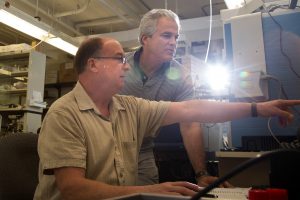The Institutional Animal Care and Use Committee (IACUC) is a local working group appointed by animal research facilities in accordance with the Animal Welfare Act (AWA) and the Public Health Services (PHS) Policy on Humane Care and Use of Laboratory Animals.
Among the most important IACUC functions are to:
- Review and approve proposed activities that will involve animals as well as any significant changes in IACUC-approved proposals that may arise later. These proposals must be approved by the IACUC before activity begins and provide detailed information such as assurances that alternatives to potentially painful procedures were actively considered, that a veterinarian was consulted in the design of the project to assure that pain or distress animals might experience will be avoided or minimized and that the project does not unnecessarily duplicate previous experiments.
- Inspect all animal facilities and study areas every six months.
- Monitor the institution’s program for humane care and use of animals; evaluate compliance with the AWA, PHS Policy and other requirements and report to the responsible institutional official and federal agencies as described in their respective rules.
- Investigate concerns or complaints received from facility personnel or the public.
Suspend an activity involving animals if the activity is not being conducted in accordance with the AWA and PHS Policy as approved by the IACUC.
The IACUC oversees the specific use of animals by formally reviewing animal use protocols and granting approval prior to the work commencing. Recently the IACUC compiled data from the past 3 years on the number of days it took to secure approval of 68 protocols. On average it took 42 business days to secure approval of which 25 days were “IACUC days” (administrative handling and IACUC review). The review timeline is posted on the IACUC website: http://ors.umkc.edu/docs/default-source/iacuc/iacuc-review-timelines.pdf?sfvrsn=0
The 2 valid methods of protocol review are either full committee review (FCR) or designated member review (DMR). (PHS Policy IV.C.2.) To reduce the burden on the IACUC members, a pre-review is done by the research compliance staff, attending veterinarian and the IACUC chair to confirm the information provided in the IACUC protocol by the PI is correct. Veterinary pre-review allows for the attending veterinarian to review the protocol to ensure that any and all veterinary matters are addressed. Once PI addresses the concerns or questions from the pre-review the protocol is sent to all IACUC members for review. The IACUC member(s) may feel that FCR is needed or as in most cases the protocol goes to a DMR.
FCR may only be conducted at a convened meeting with a quorum (simple majority) of members present. A majority vote of the quorum present is needed to approve, require modifications in (to secure approval), or withhold approval of a protocol. When substantive modifications are required in a protocol to secure approval, the resubmitted protocol must be reviewed using either FCR or DMR.
DMR may occur only after all IACUC members have been provided with the protocol to be reviewed and have an opportunity to call for FCR. If FCR is not requested, at least one member of the IACUC qualified to conduct the review is designated by the Chair. DMR may result in approval, require modifications in (to secure approval), or request FCR. DMR may not result in disapproval.

 Mass spectrometers are ultra-sensitive analytical instruments that identity chemicals (charged molecules) based on an extremely accurate measurement of their mass. Modern state-of-the-art mass spectrometers are versatile “wonder instruments” capable of identifying everything from a mixture of small molecules in relatively pure form to the total identity of every single protein and small molecule found in blood or living cells. Advances in design, sensitivity, speed and accuracy have made mass spectrometers indispensable instruments for modern biology, biochemistry and experimental medicine. UMKC is fortunate to have two mass spectrometry facilities, one housed in the School of Biological Sciences and one in the School of Pharmacy.
Mass spectrometers are ultra-sensitive analytical instruments that identity chemicals (charged molecules) based on an extremely accurate measurement of their mass. Modern state-of-the-art mass spectrometers are versatile “wonder instruments” capable of identifying everything from a mixture of small molecules in relatively pure form to the total identity of every single protein and small molecule found in blood or living cells. Advances in design, sensitivity, speed and accuracy have made mass spectrometers indispensable instruments for modern biology, biochemistry and experimental medicine. UMKC is fortunate to have two mass spectrometry facilities, one housed in the School of Biological Sciences and one in the School of Pharmacy.